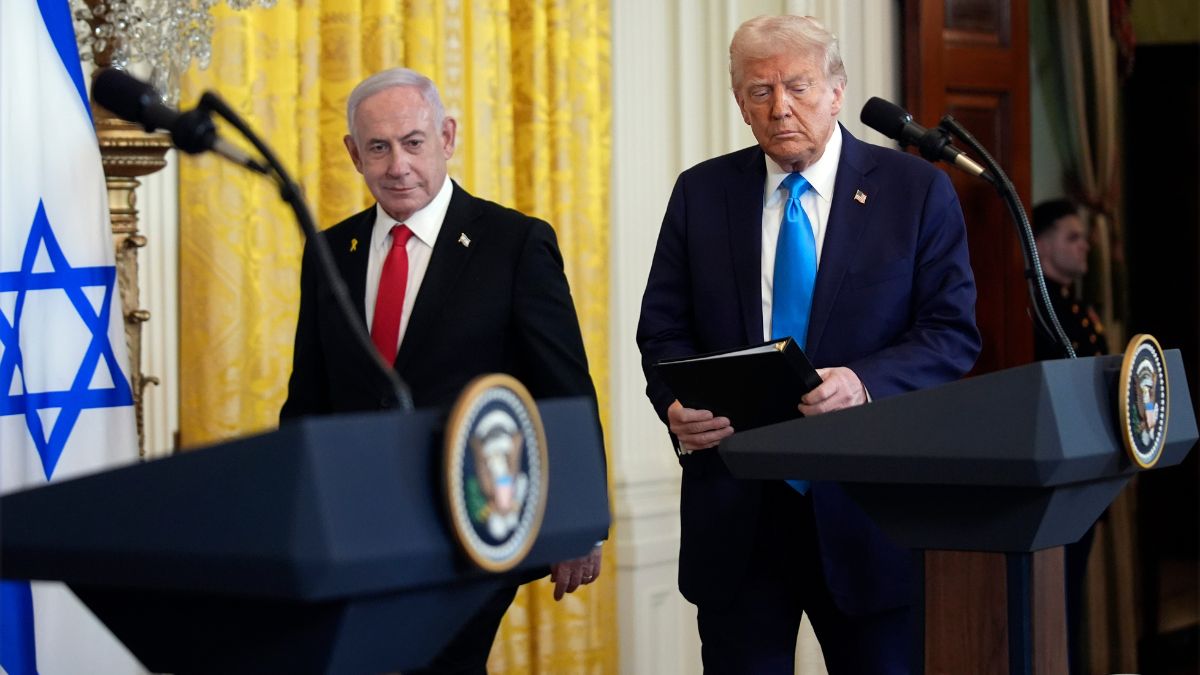While an Israeli negotiating team is in Qatar to explore the possibility of a ceasefire in Gaza, the real action is expected in Washington today as President Donald Trump hosts Israeli Prime Minister Benjamin Netanyahu for high-stakes talks.
According to reports, Trump, who has described the latest 60-day truce proposal as “final", is aiming to unveil the potential ceasefire deal alongside Netanyahu at the White House.
With the latest round of indirect ceasefire talks between Israel and Hamas ending without progress and expected to resume in Doha on Monday, the real political pressure and potential breakthrough may now shift to Washington, added reports.
Netanyahu and Trump share a complicated personal relationship — one that saw Trump expressing open frustration with the Israeli leader just last month during tense efforts to broker a truce with Iran.
Despite past tensions, the two have appeared closely aligned since the US launched airstrikes on Iran’s nuclear facilities, a major objective for Israeli military planners, reported The Guardian.
Now arriving in Washington, Netanyahu is seen as politically strengthened at home, which may provide him with the diplomatic space to pursue a ceasefire in Gaza without triggering backlash from his right-wing base that could destabilise his coalition government, added the report, citing analysts.
Hamas seeks key revisions
This week, Hamas gave a “positive” response to Israel’s 60-day ceasefire proposal, but its negotiators are demanding key revisions — including a permanent end to hostilities and a shift in aid distribution oversight from the US and Israeli-supported Gaza Humanitarian Foundation to the United Nations.
Impact Shorts
More ShortsThe foundation has faced significant criticism, with repeated incidents of Israeli forces firing on civilians at aid distribution points, resulting in hundreds of deaths.
While Israel has rejected these conditions as “unacceptable”, Netanyahu agreed to send negotiators to Qatar for indirect talks with Hamas.
Before departing for Washington on Sunday, he described the moment as a chance “to expand the circle of peace far beyond what we could have imagined.”
Netanyahu said Israeli negotiators in Qatar had clear instructions to pursue a deal based on terms already accepted by Israel, and suggested Trump could play a key role in securing that outcome, according to Reuters.
“We’ve already transformed the Middle East beyond recognition, and now have a chance to build a brighter future for Israel and the region,” Netanyahu was quoted as saying.
The Qatar talks — the first in six weeks — come as Trump expressed optimism aboard Air Force One on Friday, telling reporters, “There could be a Gaza deal next week.”
Ahead of the talks, Netanyahu’s top adviser, Ron Dermer, met in Washington with Vice President JD Vance, Secretary of State Marco Rubio, and Middle East envoy Steve Witkoff. Sources told The Guardian the discussions focused on postwar plans to eliminate Hamas’s control in Gaza and hand over reconstruction to the international community.
The latest version of the deal would have Hamas release 28 Israeli hostages – 10 alive and 18 bodies – over the course of the 60-day ceasefire.
The UN and Palestine Red Crescent Society would be given additional licence to expand aid operations in Gaza. The Israeli army would withdraw first from parts of northern Gaza, and one week later would pull out from parts of the south.
The deal would leave approximately 22 hostages, 10 of them alive, still held in Gaza.
No progress in Doha talks
Meanwhile, even as momentum appears to be building in Washington as Netanyahu prepares to meet Trump today, the latest round of indirect ceasefire talks between Israel and Hamas ended without a breakthrough, BBC reported, quoting a Palestinian official familiar with the negotiations.
According to the official, the session lasted for nearly three-and-a-half hours and took place in two separate buildings in Doha.
Messages and clarifications were exchanged between the two sides through Qatari and Egyptian mediators, but no progress was achieved.
The official added that talks are expected to resume on Monday, as mediators plan to hold separate meetings with each delegation in an effort to overcome the obstacles and narrow the gaps between the two sides.
According to Reuters, citing two Palestinian officials, the Israeli delegation was not “sufficiently authorised” to reach an agreement with Hamas because it had “no real powers”.
Qatari and Egyptian mediators face an uphill task as indirect talks resume on Monday, aiming to resolve the same sticking points that have stalled previous efforts since the last ceasefire collapsed in March.
Since then, Israel has intensified its military campaign and enforced an 11-week aid blockade on Gaza —partially eased in recent weeks — saying the pressure is meant to weaken Hamas and secure the release of hostages.
In the past 24 hours alone, the Israeli military reported striking 130 Hamas targets and killing several militants. Meanwhile, the toll on civilians continues to rise, with Gaza hospital officials reporting over 30 deaths on Sunday.
The key questions now is if mediators can forge a workable deal, and can Trump convince Netanyahu, in their meeting Monday, that it’s time to end the war?
With inputs from agencies
)